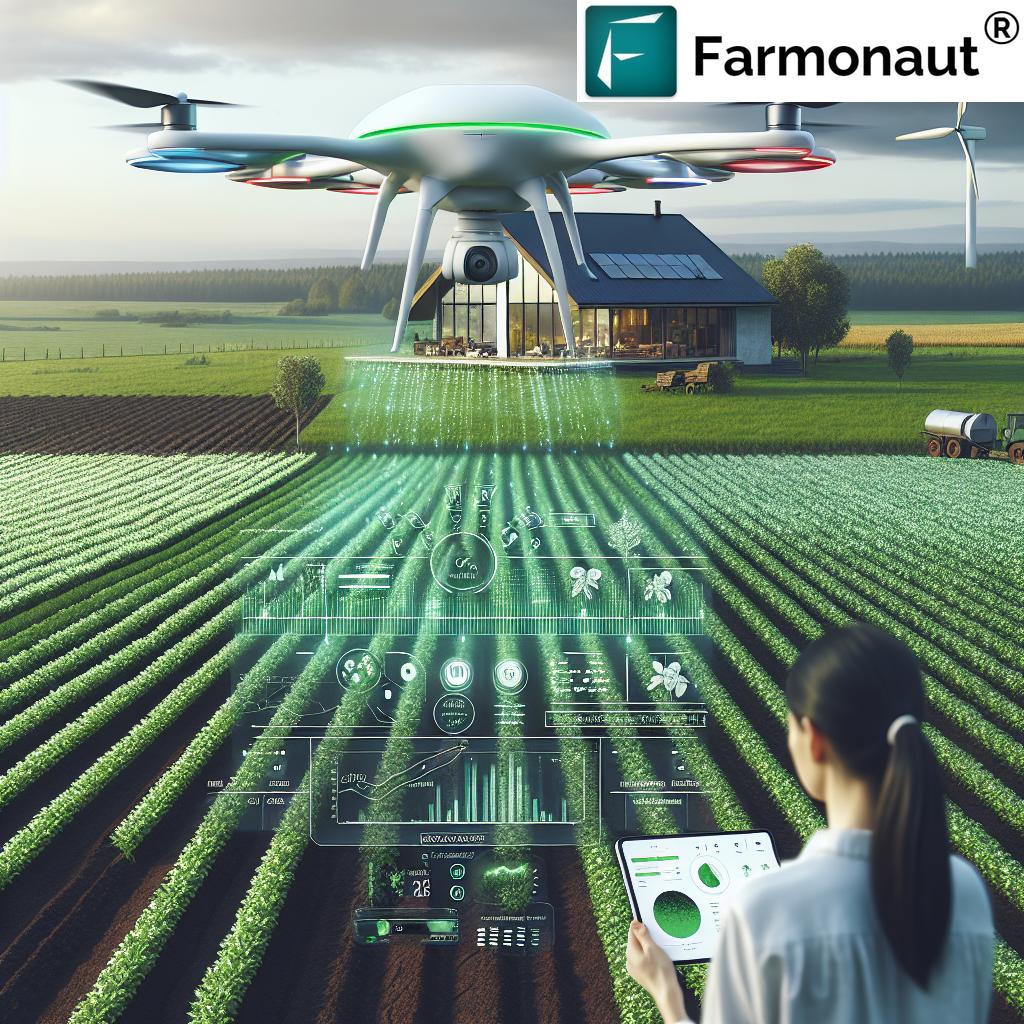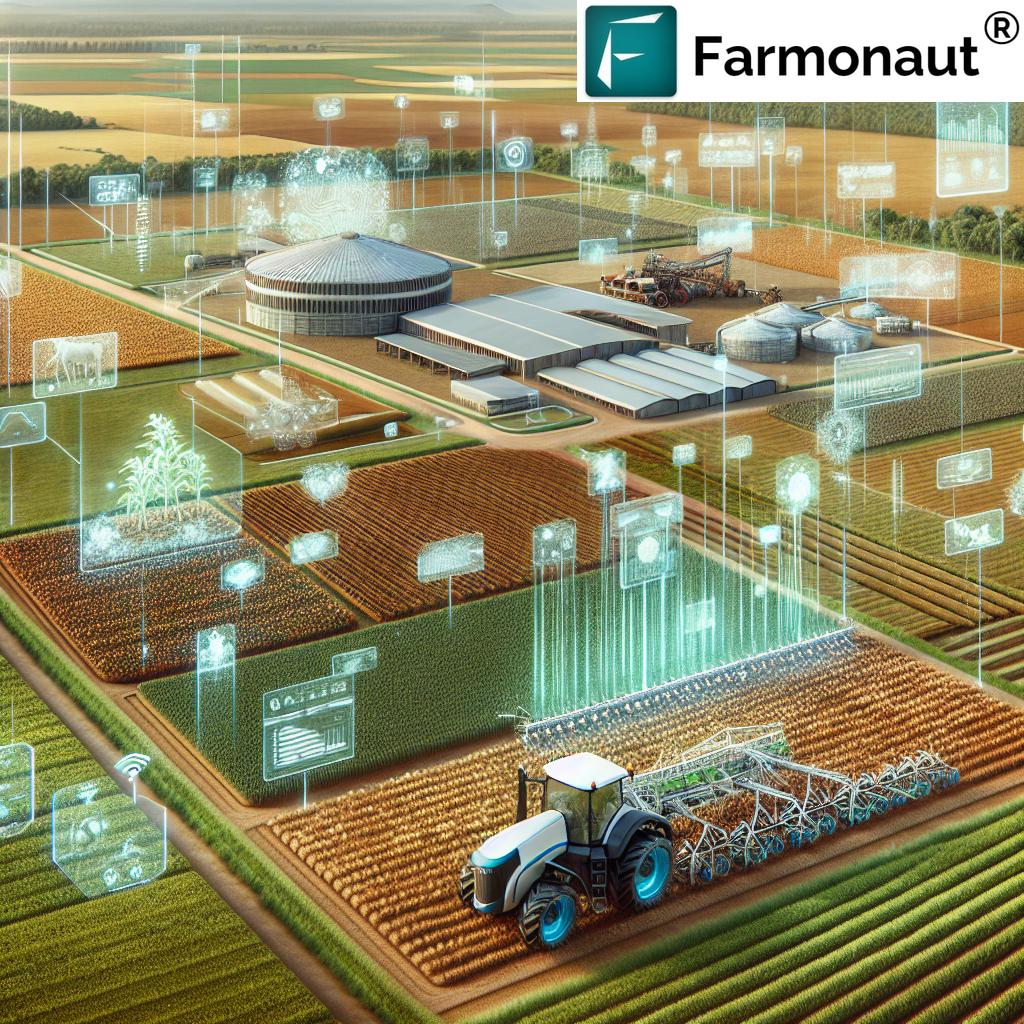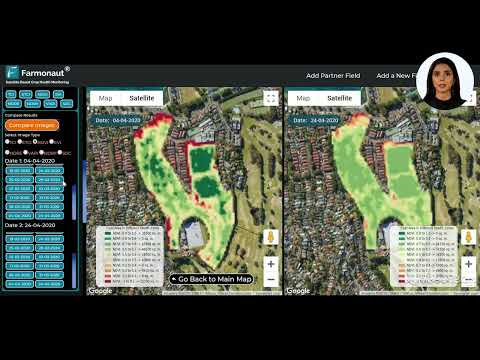Revolutionizing Rural Development: How Precision Agriculture Technology is Transforming Sustainable Farming Practices

“Precision agriculture technology can increase crop yields by up to 30% while reducing water usage by 50%, revolutionizing sustainable farming practices.”
In the ever-evolving landscape of agriculture, we are witnessing a remarkable transformation that is reshaping rural communities and redefining sustainable farming practices. At the heart of this revolution lies precision agriculture technology, a suite of innovative tools and techniques that are empowering farmers to make data-driven decisions, optimize resource use, and boost productivity. In this comprehensive guide, we’ll explore how these cutting-edge solutions are not only enhancing farm operations but also addressing critical challenges in food security, animal welfare, and environmental sustainability.
The Rise of Smart Farm Management
Smart farm management is at the forefront of the agricultural revolution, integrating advanced technologies to streamline operations and improve decision-making processes. Let’s delve into some key components:
- Crop Monitoring Systems: These systems utilize satellite imagery, drones, and ground sensors to provide real-time data on crop health, soil moisture, and potential pest infestations.
- Livestock Management Software: Advanced software solutions help farmers track animal health, optimize feeding schedules, and monitor reproductive cycles, ensuring better animal welfare and productivity.
- Farm Data Analytics: By leveraging big data and artificial intelligence, farmers can analyze historical and real-time information to make informed decisions about planting, harvesting, and resource allocation.
The integration of these technologies is revolutionizing the way we approach farming, making it more efficient, sustainable, and responsive to environmental challenges.
Government Initiatives Driving Agricultural Innovation
Governments worldwide are recognizing the potential of precision agriculture to address food security concerns and promote sustainable rural development. Here are some notable initiatives:
- Financial Support: Many countries are offering grants and subsidies to farmers adopting precision agriculture technologies, making these innovations more accessible to small and medium-sized farms.
- Research and Development: Government-funded research programs are fostering collaboration between universities, private companies, and farmers to develop and refine agtech solutions.
- Policy Frameworks: New legislation is being introduced to support the implementation of digital agriculture solutions, addressing issues such as data privacy and standardization.
These initiatives are creating a fertile ground for innovation in the agricultural sector, driving rural economic growth and enhancing food production capabilities.
The Impact of Agtech Solutions on Food Security
One of the most significant benefits of precision agriculture technology is its potential to enhance food security. By optimizing crop yields and reducing waste, these solutions are helping to meet the growing global demand for food:
- Increased Productivity: Precision farming techniques can significantly boost crop yields by optimizing planting density, fertilizer application, and irrigation.
- Reduced Crop Losses: Early detection of pests and diseases through advanced monitoring systems allows for timely interventions, minimizing crop losses.
- Resource Efficiency: Smart irrigation systems and precision fertilizer application reduce water and chemical usage, making farming more sustainable and cost-effective.
As we face the challenges of climate change and population growth, these technologies will play a crucial role in ensuring a stable and abundant food supply.
Enhancing Animal Welfare through Technology
Precision agriculture isn’t limited to crop production; it’s also revolutionizing livestock management and improving animal welfare:
- Health Monitoring: Wearable devices for livestock can track vital signs and activity levels, alerting farmers to potential health issues before they become serious.
- Automated Feeding Systems: Smart feeders can dispense precise amounts of feed based on individual animal needs, optimizing nutrition and reducing waste.
- Environmental Control: Advanced climate control systems in barns and stables ensure optimal living conditions for animals, reducing stress and improving overall well-being.
By implementing these technologies, farmers can not only improve the welfare of their animals but also enhance the quality and safety of animal products.
The Role of Agricultural Drone Solutions
Agricultural drones have emerged as a game-changing technology in precision farming. These unmanned aerial vehicles offer a range of benefits:
- Crop Mapping: Drones equipped with multispectral cameras can create detailed maps of crop health, helping farmers identify areas that need attention.
- Precision Spraying: Drone-based spraying systems can apply pesticides and fertilizers with pinpoint accuracy, reducing chemical usage and environmental impact.
- Livestock Monitoring: In large pastures, drones can help locate and monitor livestock, saving time and labor for farmers.
The versatility and efficiency of agricultural drones are making them an increasingly popular tool for farmers of all scales.
Financial and Legal Aspects of Implementing Digital Agriculture Solutions
While the benefits of precision agriculture are clear, there are important financial and legal considerations for farmers looking to adopt these technologies:
- Investment Costs: The initial investment in precision agriculture equipment can be significant. However, many farmers find that the long-term savings and productivity gains justify the expense.
- Data Ownership and Privacy: As farm operations become more data-driven, questions of data ownership and privacy have come to the forefront. New legal frameworks are being developed to address these concerns.
- Insurance and Risk Management: Some insurance providers are offering incentives for farmers who implement precision agriculture technologies, recognizing their potential to reduce risk.
Navigating these aspects requires careful planning and often the guidance of agricultural finance and legal experts.
Training and Education for the Future of Farming
As precision agriculture technology becomes more prevalent, there’s a growing need for education and training in these new methodologies:
- Agricultural Extension Programs: Many universities and government agencies are offering courses and workshops on precision agriculture techniques.
- Online Learning Platforms: Digital learning resources are making it easier for farmers to access training on new technologies and practices.
- Peer-to-Peer Learning: Farmer networks and cooperatives are facilitating knowledge sharing and best practices in precision agriculture.
Investing in education and skills development is crucial for maximizing the benefits of these new technologies and ensuring their widespread adoption.
“Government initiatives supporting agricultural innovation have led to a 40% increase in the adoption of smart farm management systems over the past 5 years.”
The Future of Farm Vehicles and Machinery
The integration of precision agriculture technology is also transforming farm vehicles and machinery:
- Autonomous Tractors: Self-driving tractors equipped with GPS guidance systems can perform tasks with incredible precision, reducing operator fatigue and improving efficiency.
- Smart Implements: Attachments like planters and sprayers are becoming increasingly sophisticated, with the ability to adjust their operations based on real-time data.
- Electric and Hybrid Vehicles: As part of the push for sustainability, we’re seeing a growing interest in electric and hybrid farm vehicles that reduce emissions and operating costs.
These advancements in farm machinery are not only improving productivity but also contributing to the overall sustainability of farming operations.
Precision Agriculture and Rural Development
The impact of precision agriculture extends beyond individual farms, playing a significant role in rural development:
- Job Creation: The adoption of new technologies is creating demand for skilled workers in rural areas, from drone operators to data analysts.
- Economic Growth: Increased farm productivity and efficiency can lead to higher incomes for farmers and boost local economies.
- Infrastructure Development: The need for reliable internet connectivity to support precision agriculture is driving improvements in rural digital infrastructure.
By fostering innovation and economic opportunity, precision agriculture is helping to revitalize rural communities and make farming an attractive career for the next generation.
Explore Farmonaut’s API for advanced satellite and weather data integration
Environmental Impact and Sustainability
Precision agriculture technology is playing a crucial role in making farming more environmentally sustainable:
- Reduced Chemical Use: Targeted application of pesticides and fertilizers minimizes runoff and soil contamination.
- Water Conservation: Smart irrigation systems can significantly reduce water usage while maintaining or improving crop yields.
- Soil Health: Precision tillage and planting techniques help preserve soil structure and reduce erosion.
- Carbon Footprint Reduction: Optimized operations and resource use lead to lower greenhouse gas emissions from farming activities.
These environmental benefits are not only important for the planet but also contribute to the long-term viability of farming operations.
Comparison Table: Precision Agriculture Technologies and Their Impact
| Technology | Applications | Benefits | Productivity Improvement | Resource Savings | Cost Reduction | Government Support |
|---|---|---|---|---|---|---|
| Crop Monitoring Systems | Real-time crop health analysis, pest detection | Early problem identification, optimized interventions | Up to 20% | 30% reduction in pesticide use | 15-25% | Subsidies for sensor technology |
| Agricultural Drones | Aerial imaging, precision spraying | Improved crop mapping, targeted treatments | 10-15% | 40% reduction in chemical use | 20-30% | Grants for drone technology adoption |
| Farm Management Software | Data analysis, resource planning | Informed decision-making, streamlined operations | 15-25% | 20% reduction in input waste | 10-20% | Tax incentives for digital adoption |
| Livestock Management Tools | Health monitoring, automated feeding | Improved animal welfare, optimized production | Up to 30% | 25% reduction in feed waste | 15-25% | Research funding for livestock tech |
Access Farmonaut’s API Developer Documentation for seamless integration
Challenges and Considerations
While the benefits of precision agriculture are substantial, there are challenges to consider:
- Digital Divide: Ensuring equitable access to technology and connectivity in rural areas remains a significant challenge.
- Skills Gap: There’s a need for ongoing education and training to help farmers and agricultural workers adapt to new technologies.
- Data Management: As farms generate more data, effective management and analysis of this information become crucial.
- Interoperability: Ensuring different systems and devices can work together seamlessly is an ongoing challenge for the industry.
Addressing these challenges will be key to realizing the full potential of precision agriculture technology.
The Role of Farmonaut in Precision Agriculture
As we explore the landscape of precision agriculture, it’s important to highlight the contributions of innovative companies like Farmonaut. Farmonaut is at the forefront of making precision agriculture technology accessible and affordable to farmers worldwide.
- Satellite-Based Crop Monitoring: Farmonaut’s platform uses multispectral satellite imagery to provide farmers with real-time insights into crop health, soil moisture, and other critical metrics.
- AI-Powered Advisory: The Jeevn AI system offers personalized farm advice, helping farmers make data-driven decisions about crop management.
- Blockchain Traceability: Farmonaut’s blockchain solutions enhance supply chain transparency, building trust between producers and consumers.
- Resource Management Tools: From fleet management to carbon footprint tracking, Farmonaut offers a suite of tools to optimize farm operations and promote sustainability.
By leveraging these advanced technologies, Farmonaut is helping to bridge the gap between traditional farming practices and the digital future of agriculture.
The Global Impact of Precision Agriculture
The adoption of precision agriculture technology is having a profound impact on farming communities worldwide:
- Developing Countries: In regions with limited resources, precision agriculture is helping smallholder farmers increase yields and improve food security.
- Developed Nations: Advanced economies are using these technologies to address labor shortages and maintain competitiveness in global markets.
- Climate Change Adaptation: Precision agriculture tools are helping farmers adapt to changing weather patterns and extreme events.
- Sustainable Development Goals: These technologies are contributing to several UN Sustainable Development Goals, including Zero Hunger and Responsible Consumption and Production.
The global reach of precision agriculture underscores its potential to transform farming practices and address some of the world’s most pressing challenges.
Looking to the Future
As we look ahead, the future of precision agriculture is filled with exciting possibilities:
- Artificial Intelligence and Machine Learning: Advanced AI systems will provide even more accurate predictions and recommendations for farm management.
- Internet of Things (IoT): The proliferation of connected devices will create an even more comprehensive picture of farm operations.
- Vertical Farming: Precision agriculture techniques are being adapted for urban environments, potentially revolutionizing food production in cities.
- Genetic Engineering: Advances in biotechnology, coupled with precision agriculture, could lead to more resilient and productive crop varieties.
These emerging technologies promise to further enhance the efficiency, sustainability, and productivity of farming operations around the world.
Conclusion
The revolution in precision agriculture technology is transforming rural communities and redefining sustainable farming practices. From crop monitoring systems to livestock management software, these innovations are empowering farmers to make data-driven decisions, optimize resource use, and boost productivity. Government initiatives and policies are playing a crucial role in supporting this agricultural innovation, addressing challenges in food security, animal welfare, and environmental sustainability.
As we’ve explored, the impact of these technologies extends far beyond individual farms. Precision agriculture is driving rural development, creating new job opportunities, and contributing to the overall sustainability of our food systems. Companies like Farmonaut are at the forefront of this revolution, making advanced agricultural solutions accessible to farmers worldwide.
While challenges remain, particularly in terms of equitable access and skills development, the potential benefits of precision agriculture are immense. As these technologies continue to evolve and become more widely adopted, they will play an increasingly important role in ensuring a sustainable and food-secure future for communities around the globe.
The future of farming is here, and it’s precise, data-driven, and sustainable. By embracing these innovations, we can build a more resilient and productive agricultural sector that meets the needs of both present and future generations.
FAQ Section
- What is precision agriculture technology?
Precision agriculture technology refers to a set of tools and techniques that use data-driven insights to optimize farming practices, including crop monitoring systems, GPS-guided machinery, and advanced analytics. - How does precision agriculture contribute to sustainability?
Precision agriculture enhances sustainability by reducing resource waste, minimizing chemical use, and improving overall farm efficiency, leading to lower environmental impact and increased productivity. - What role do drones play in precision agriculture?
Drones are used for aerial imaging, crop health assessment, precision spraying, and livestock monitoring, providing farmers with valuable data and improving efficiency. - How is precision agriculture impacting rural development?
Precision agriculture is creating new job opportunities, driving economic growth, and improving digital infrastructure in rural areas, contributing to overall rural development. - What are some challenges in adopting precision agriculture technology?
Challenges include initial investment costs, the need for technical skills and training, data management complexities, and ensuring equitable access to technology in rural areas.







